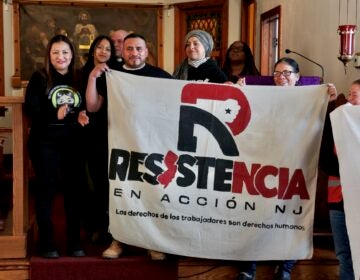Princeton Borough, Township to vote on consolidation
There are about 50 towns in New Jersey that are completely or mostly surrounded by another, larger municipality. For years, there has been a campaign to merge the “doughnut towns” merge.
After three failed efforts, another attempt is under way to merge Princeton Township and Princeton Borough. Voters will be asked to decide on whether to consolidate in a referendum on the Nov. 8 ballot.
Supporters and opponents of combining the two Princetons are focused on the potential costs savings and how it would affect community identity.
Weighing savings, losses
The savings will be minimal, said Kate Warren of the Preserve Our Historic Borough group, which opposes consolidation. With Princeton Township having about twice the population of the borough, Warren said a merger would reduce the influence of borough residents now wield.
“There’s no guarantee that we will have that representation on the zoning board, the school board, the recreation board, all of those joint boards now,” she said. “Once you become such a minority in the larger pool, there’s no guarantee you will continue to have a voice.”
For example, Warren said zoning rules now limit the height of buildings in Princeton Borough.
“In a larger community, the race for ratables may be that you would want to build up in the center of town and not have those ratables in the outer reaches,” she said.
Supporters of consolidation see it differently.
Peter Wolanin, the co-chair of Unite Princeton, said a combined government will be more efficient.
“We will actually make it more possible for citizens to be involved when there are issues that affect them without having to deal with two separate governments to have their voice heard,” he said.
The 10-member commission that studied consolidation for the past few years concluded it would save about $3.2 million a year. Most of that would come by shedding jobs through attrition.
Princeton Township Mayor Chad Goerner, a member of the commission, said he welcomes Gov. Chris Christie’s proposal to allow the transition costs of municipal consolidations to be spread over five years. The state would even pick up 20 percent of the tab by paying the first year’s share.
“The impact in the first year of transition costs could potentially negate the savings level,” Goerner said. “So it’s nice to have that year. And then, by the second year, we hopefully would have ramped up our full savings amount.”
Dozens of doughnuts—and holes
Geographically, Princeton Borough is surrounded by the township, like the hole in a doughnut.
New Jersey League of Municipalities executive director Bill Dressel said there are about 50 similar pairs of towns in New Jersey. Most of those communities, said Dressel, are not anxious to combine.
“Princeton Township and Princeton Borough are almost synonymous and many of the communities in the doughnut-in-the-hole kinds of situations really don’t have that kind of identity,” he said. “They have their own real separate identity and that is a major issue.”
Dressel said many towns are opting to reduce costs by sharing services instead of a wholesale merger.
The Princetons already have gone that route. Goerner said the township already shares 13 municipal services with the borough
“I feel that we’ve reached a tipping point where they are more cumbersome than they are effective because of the fact that we have to have every single budget item approved by both governing bodies,” the township mayor said. “The amount of time that’s taken in managing those shared services with two governing bodies is significant.”
The last time it was proposed, Princeton voters rejected consolidation.
This time, Wolanin said he believes people will be more comfortable voting for it.
“There’s been turnover in the borough. There are new people here … and I think a lot of that opposition (comes from) people that have lived there their whole lives,” he said. “People who are newer don’t see that distinction between the borough and the township as being as important.”
Most residents have definite opinion
A few of the residents walking along Nassau Street, not far from the border between the borough and the township, said they were not aware of the merger referendum. Most residents are well acquainted with the issues and all the arguments surrounding it.
One of those residents is Doug Watson who lives in the borough.
“It’s the smart thing to do. It makes all kinds of sense,” Watson said. “The money that they’re going to save may not be much right now. But down the road, it’s going to work.
Township resident John Beeson said he’s not certain whether he’ll vote for consolidation.
“There are some significant questions about how they’re going to make decision about the future of Princeton, what’s going to stay, what’s going to go by the wayside,” Beeson said. “Whether or not they’re even going to save money to actually consolidate or not.”
Borough resident Karen Aurup also has some concerns about a merger.
“I do not believe in bigger government. I like the idea of having that small borough in here, and I don’t the savings … is going to be enough.”
While it’s an issue that has polarized many, township resident Steve Mackey said consolation is not a big deal for him.
“A lot of the borough concerns have to do with historical concerns, and I don’t think that will affect me either way,” he said.
If residents approve the merger, the borough and township will still have separate governments for a year. An election for local officials in a combined Princeton would be held in November of 2012.
WHYY is your source for fact-based, in-depth journalism and information. As a nonprofit organization, we rely on financial support from readers like you. Please give today.




